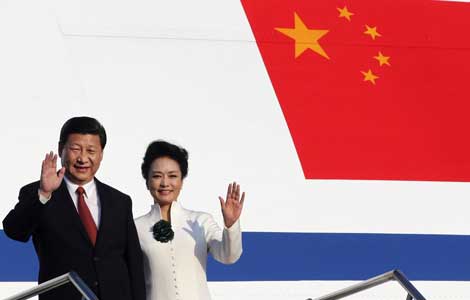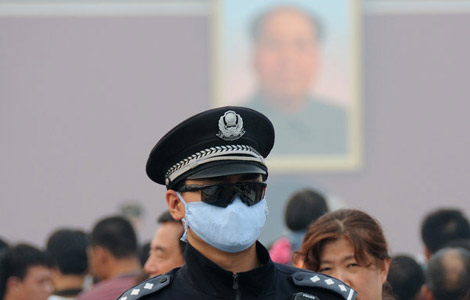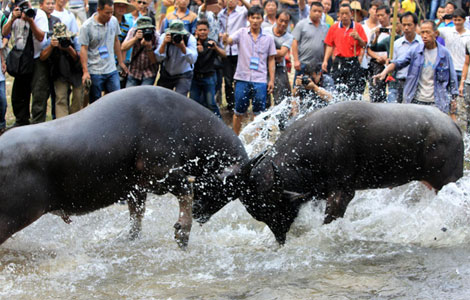China aims for mutually-beneficial ties with neighbors
Updated: 2013-10-06 19:20
(Xinhua)
|
||||||||
BEIJING - Chinese Premier Li Keqiang's upcoming Southeast Asia trip, due on Wednesday, aims to build a mutually-beneficial and win-win relationship with its neighbors.
The trip, in the wake of President Xi Jinping's ongoing Southeast Asia tour, reflects Chinese leaders' strategy of building a favorable environment for the development of the world's second largest economy.
During his seven-day tour in Southeast Asia, Li will pay official visits to Brunei, Thailand and Vietnam.
He is also scheduled to attend a summit with the Association of Southeast Asian Nations (ASEAN) and a series of East Asia leaders meetings in Seri Begawan, capital of Brunei.
As Qi Jianguo, former ambassador to Vietnam, said that for China's peaceful development, the visits would deepen China's strategic partnership with ASEAN and strengthen pragmatic cooperation with the three countries.
MUTUAL POLITICAL TRUST, GOOD-NEIGHBORLINESS
Over the past decade, China's relations with ASEAN member states have been raised to a new level, a hard-won achievement for both sides, while cooperation between them has yielded remarkable results and will have a bright future.
Li's three-leg tour in Southeast Asia comes at the 10th anniversary of the establishment of the China-ASEAN strategic partnership.
For years, China has unremittingly pursued and implemented a foreign policy of building a good neighborly relationship and partnership with neighboring countries, including ASEAN members.
Just as Li put it at the 10th China-ASEAN Expo in the southern Chinese city of Nanning last month, the two sides were not only able to build a "Golden Decade" over the past 10 years, but also have the ability to create another "Diamond Decade" in the future.
As neighbors, China and many ASEAN member states may be involved in complicated geo-political issues. Both sides need to bear in mind their overall interests and promote mutual trust, so as to get on a right track for cooperation of mutual benefits.
Through contacts among top leaders at both personal and working levels, Li's visits to Brunei, Thailand and Vietnam will help enhance mutual political trust between China and the three countries, so as to lay a solid foundation for their further pragmatic cooperation in various fields.
China will also adhere to its policy toward ASEAN by developing the strategic partnership with the regional bloc, resolving their differences and disputes through peaceful, friendly negotiations, and jointly safeguarding regional peace and stability.
"China has become a major force supporting ASEAN's integration and strengthening ASEAN's leading role in the region, a main focus of the bloc," said Ruan Zongze, a researcher with the China Institute of International Studies (CIIS).
As for the differences on the South China Sea issue between China and some ASEAN members, Ruan said it will not hamper the common development of the two sides.
"The South China Sea issue should not and is not able to affect the overall relationship between China and ASEAN," he said.
Li's visits will again prove that mutual political trust and mutual strategic support between China and its neighbors are conducive to their common development.

 Albuquerque International Balloon Fiesta kicks off
Albuquerque International Balloon Fiesta kicks off
 President Xi arrives in Bali island for APEC meeting
President Xi arrives in Bali island for APEC meeting
 Nadal to be No. 1 after reaching China Open final
Nadal to be No. 1 after reaching China Open final
 China to monitor smog impact on health
China to monitor smog impact on health
 Simple appeal on stage
Simple appeal on stage
 Travel highlights during Golden Week
Travel highlights during Golden Week
 Catholic conclave abides in Tibetan village
Catholic conclave abides in Tibetan village
 Buddhist Art at the gateway of the Silk Road
Buddhist Art at the gateway of the Silk Road
Most Viewed
Editor's Picks

|

|

|

|

|

|
Today's Top News
Xi urges peaceful development of cross-Straits ties
China refutes Japan's maritime concern
S. China Sea typhoon death toll rises to 10
US forces take al-Qaida leader in Libya
Low number of migrant workers have insurance
78 killed, 166 wounded in attacks across Iraq
Iran is 'a year or more' away from nuke weapon
US govt workers to be paid
US Weekly

|

|






